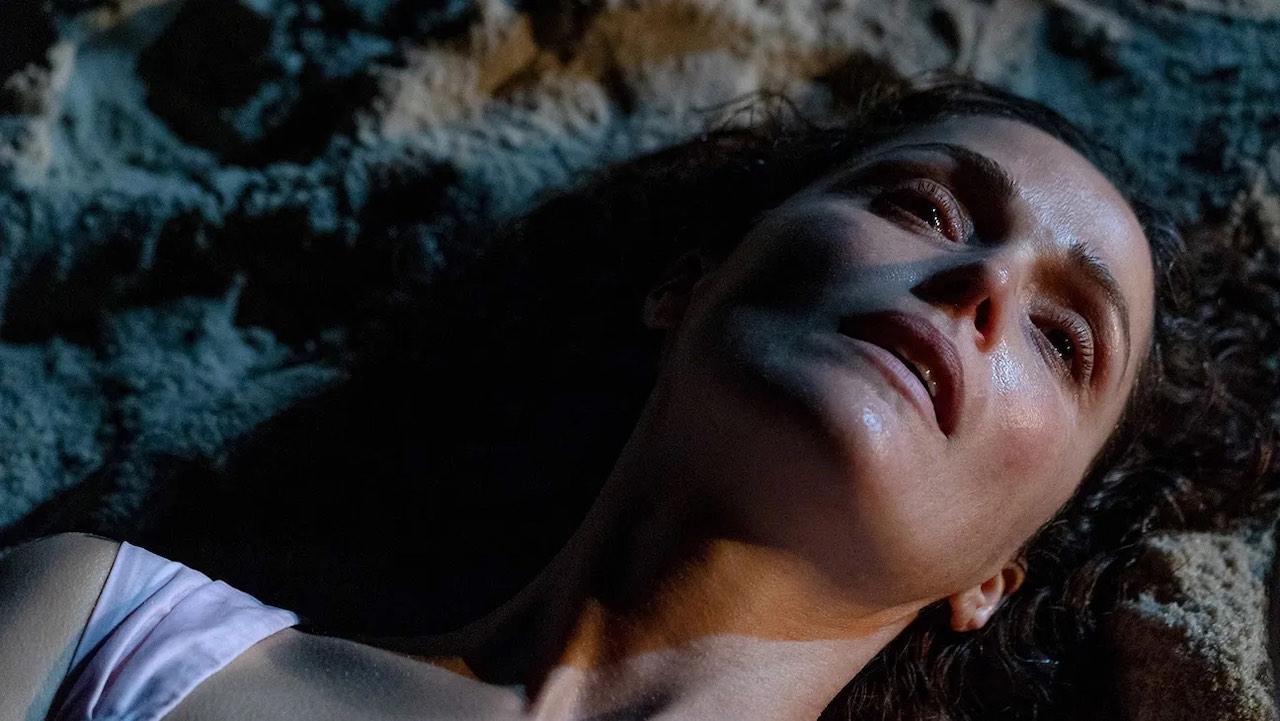In terms of narrative art forms, If I Had Legs I’d Kick You falls in line with an enigmatic, fraught lineage interested in interrogating feminine emotional collapse with a surrealist bent. Think of authors like Clarice Lispector, artists like Leonora Carrington, and films like Black Swan and The Babadook. Though aesthetically and stylistically variable, A Woman Under the Influence and Girl, Interrupted contend with similar unstable subject matter. This latest filmic iteration even features a post-dusk manic run in a white nightgown, which culminates in a figurative fight against the ocean—a staple of the “crazy girl” genre, lore, and visual rhetoric. Trust me, I’m familiar.
But fear not, potential male-identifying audience members: While focused on a woman’s first-person experience, the story will resonate more broadly with sensitive folks, especially those struggling to balance selfhood and sanity in the face of substantial responsibility. Writer-director-actor Mary Bronstein’s second feature film centers on motherhood and all the unpaid, unacknowledged labor that accompanies it, but the film also taps into a more universal feeling of existential dread and profound isolation within that framework, which, in this case, stems from severe caregiver burnout. The malaise is palpable, and the tumult is inevitable as our unreliable protagonist, Linda—a torrent at times, a mess always—begins unraveling almost immediately.
Linda’s young daughter is experiencing an undefined, severe eating aversion that requires constant monitoring and nightly feeding via a tube. This is just the first in a series of compounding crises, including a large, menacing hole in their apartment ceiling, which forces the mother and child to temporarily move to a shabby motel manned by the lovable A$AP Rocky as James and comedian Ivy Wolk as the infuriating Gen Z desk girl, Diana. Making matters worse, Linda is a therapist in love with her colleague and personal therapist, played by Conan O'Brien. This professional and emotional conflict plays out painfully as Linda, the over-intellectualizing patient, deals with her stone-faced, aloof therapist, who “doesn’t respond to [his] client’s dream emails.”
The film’s atmosphere is instantly established as the audience is plunged into the narrative in media res, finding Linda and her school-aged child speaking with a healthcare provider. The first line of dialogue is the unnamed child’s (Delaney Quinn) off-camera observation: “Mommy is stretchable.” She means her mother is malleable; she can be worn down in a way her father cannot. The audience is then forced to rapidly contend with two unique conceptual choices by Bronstein. The first is relentlessly close camerawork that stays tightly focused on Linda throughout, creating a visually intense, claustrophobic experience meant to evoke unease. The second is to keep the child’s face off-camera for nearly all of the film. This central conceit of absence is mirrored in Linda’s husband Charles (Christian Slater), who primarily presents as a disembodied voice on the phone.
For Bronstein, form follows function. She explained that this choice to hide the child from viewers serves a dual purpose. Conceptually, it mirrors Linda’s point of view, as she cannot see the humanity of her child in this moment, viewing her only as an obligation. Strategically, it's also a subtle manipulation, Bronstein noted. “Once a child’s face is introduced into the scene… your sympathy and empathy are gonna go to the child,” she noted. “I needed the audience to be so with Linda or else I would lose them so fast... I needed to take that out of the equation so that the audience is forced to just deal with Linda.”
Linda is played with masterful finesse by Rose Byrne, who won the Silver Bear for Best Leading Performance at the Berlin Film Festival for the role earlier this year and is currently generating significant and well-deserved Oscar buzz for her performance in what will likely be a career-defining role. If I Had Legs showcases the wide range she’s honed across diverse genres throughout her career, including comedy (Platonic, Bridesmaids) and horror (28 Weeks Later, a handful of Insidious films) chops, which come in handy in this genre-blending film.
If I Had Legs is one of a very few visual experiences that accurately captures what a psychological crisis actually feels like. It recreates a feeling that’s nearly impossible to bottle, which is no surprise considering director Bronstein has a master’s degree in psychology. She also worked therapeutically with children, an expertise that she brings both behind and in front of the camera (she also plays a medical professional in the film). As she mentioned during an interview following a recent screening, “I want to make movies about life, but about the feeling of life, which is why I don’t tell this in a vérité style. I tell this in an expressive style.” The result is an eerie, surreal, and dreamlike film with wonderful moments of dark humor that permeate its undercurrent of dread.
Some have likened the film to Uncut Gems in terms of its intensity. While both are anxiety-inducing, the feeling here is much more lived-in and personal than the heightened, frenetic experience curated by the Safdie brothers (it should be noted that Bronstein's husband, Ronald Bronstein, has written alongside the Safdies, and Josh Safdie is a producer). The tone of this film is melancholic unease, rooted in an existential terror that is inescapable because it comes from within.
If I Had Legs is a harrowing examination of women’s labor and the mourning that accompanies the shift when one's life takes a backseat to caregiving. Some of the film’s most decisive, most substantial moments linger in Linda’s profound loneliness and her desperate attempts at honesty, such as the quiet horror of wondering if she aborted the wrong child, or her devastating account of the procedure’s enduring, physical pain. It’s dialogue that proves the urgency of female authorship, a visceral battle cry for supporting cinema that is experimental, conceptual, and absolutely fearless in its exploration of the inner self.







